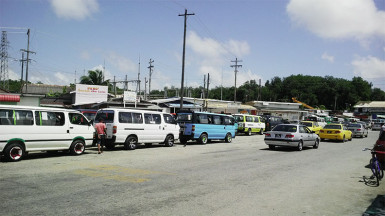Minibus drivers have expressed mixed views about the government’s plan to ban the importation of used tyres in keeping with its vision to promote a green economy.
The proposed ban was one of several measures presented by Finance Minister Winston Jordan during Friday’s 2016 budget reading. Giving notice of intent to ban the importation of used tyres, Jordan said too that taxes on new tyres would be reduced to encourage their use. The ban is to be put into effect “as soon as some procedural hurdles are cleared,” he said.
While some have applauded the government’s decision to impose the ban, others have expressed outrage citing the cost of new tyres, irrespective of plans to lower the importation taxes attached to the commodity.

Yesterday a group of minibus drivers who operate along the UG-Industry route collectively expressed their dissatisfaction with the proposal.
“A new tyre is about $18,000 to $20,000 and even if they tek off the tax it’s going to be $15,000,” one driver said. He claimed that Guyana “does not have the type of road to suit the use of new tyres.”
“They should continue the importation of the used tyres. A single old tyre costs around $5,000 and $6,000 and lasts for about 6 months. So it’s far better using used tyres here because it’s already used, it already break in,” another driver reasoned.
Additionally, they were also dissatisfied with the decision to ban the tyres, lamenting that minibus drivers were not consulted on how it would affect them.
One driver said, “They never even prepared us for things like this, it was not a collective decision that was made. Why not keep a meeting with us, the subordinates, allowing us to ask questions without being penalized?
“Tyres are not Styrofoam boxes that you can just pull off the market and get business people to find other alternatives, tyres are not like that,” he added.
“They drop the gas by $20 but is nah gas alone the bus working with. What happen to spares? It working with labour too, those things in drop, is just the gas drop,” another said. As a result, the man stated, minibus drivers will be placed under a sudden strain.
“It’s good for development yes, but as a third world country you can’t jump to that. You can’t jump to new tyres in a third world country,” one driver added.
He went on to say that with people already have a hard time “struggling to survive,” a lot of persons will have a hard time finding the extra money to purchase the new tyres. “I have a mortgage. You tell me where am I going to find $60,000 to buy four new tyres for my bus and pay my mortgage? Is best I park my bus and stop work,” he complained.
Additionally, the men highlighted the possibility that even with the benefits of the tax reduction, the quality of tyres that would be imported for distribution would be another issue that would have to be addressed.
On the other hand, when Stabroek News approached a minibus driver who operates between Georgetown and Vryheid’s Lust, he expressed his approval of the proposed ban since he believes that the use of second-hand tyres poses risks to not only the passengers he transports on a daily basis but also himself in the event of the tyres blowing out. “Let them ban it man. Them thing in good. Is better if we all just put aside a little more to purchase something better that is going to last you longer and be safer,” he stated.
Furthermore, he noted that the used tyres do not last long this was met with agreement from several other drivers and bus conductors who had also gathered to offer their comments.
One of whom said that the brand new tyres have a longer lifespan than the used ones. “Yuh get more life out of it, you would actually end up spending more money behind them second-hand tyres,” he noted. “I support the ban… Them thing does blow out on you. Now if one them is to buss and you driving at a rate, you could kill people, you could turn over,” another man offered.
Meanwhile, the intended ban has already been criticized by Leader of the Opposition Bharrat Jagdeo. At a press conference after Friday’s budget presentation, Jagdeo, a former finance minister himself, said such a ban will ultimately force an increase in the cost of public transportation and a decline in auto ownership of Guyana’s middle income earners.
“How many persons can afford new tyres? Most of the tyres that are used in our system are used tyres. Now from a safety perspective you need to look at quality regulations of them but when you ban them completely you are transferring money from the people who are importing used tyres and also taking money out of the pocket of those ordinary people who could only afford used tyres for their vehicle…If you have to buy new tyres what do you expect? The cost of transportation will go up,” he reasoned.
However, according to the drivers who spoke to this publication, passenger’s fares are not expected to increase as a result of the ban since fare increases are mostly linked to fuel prices.




